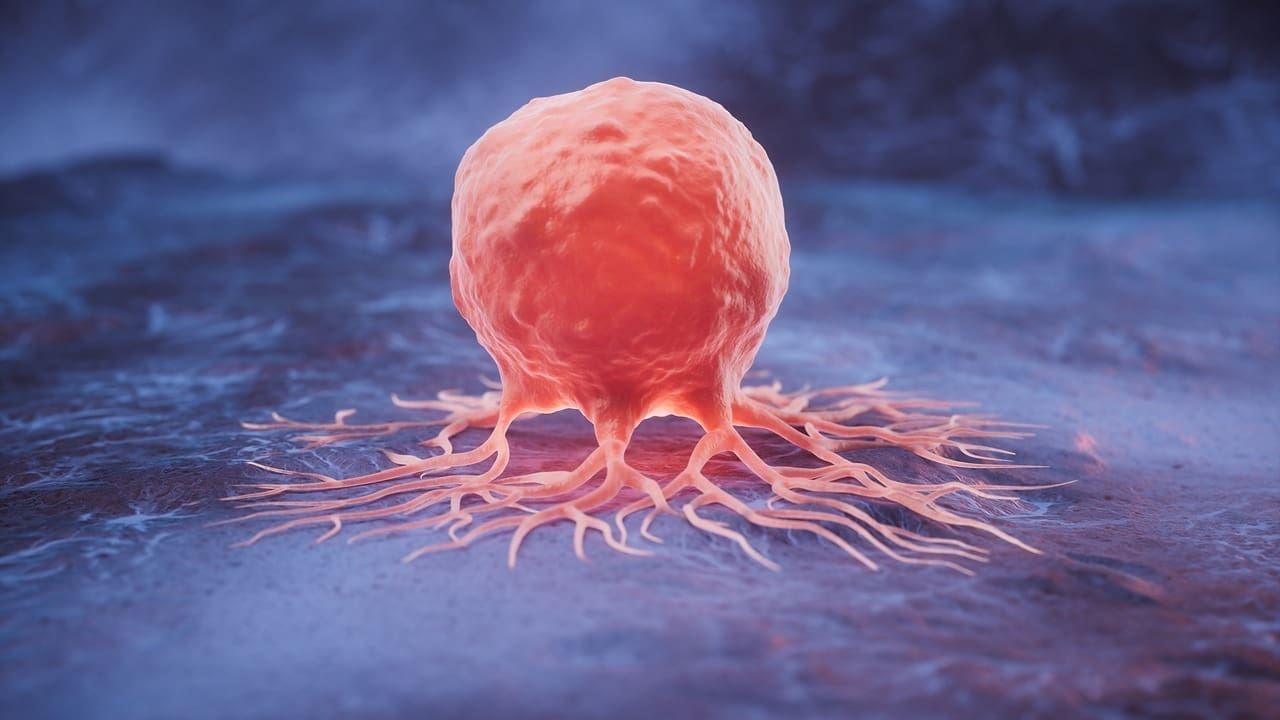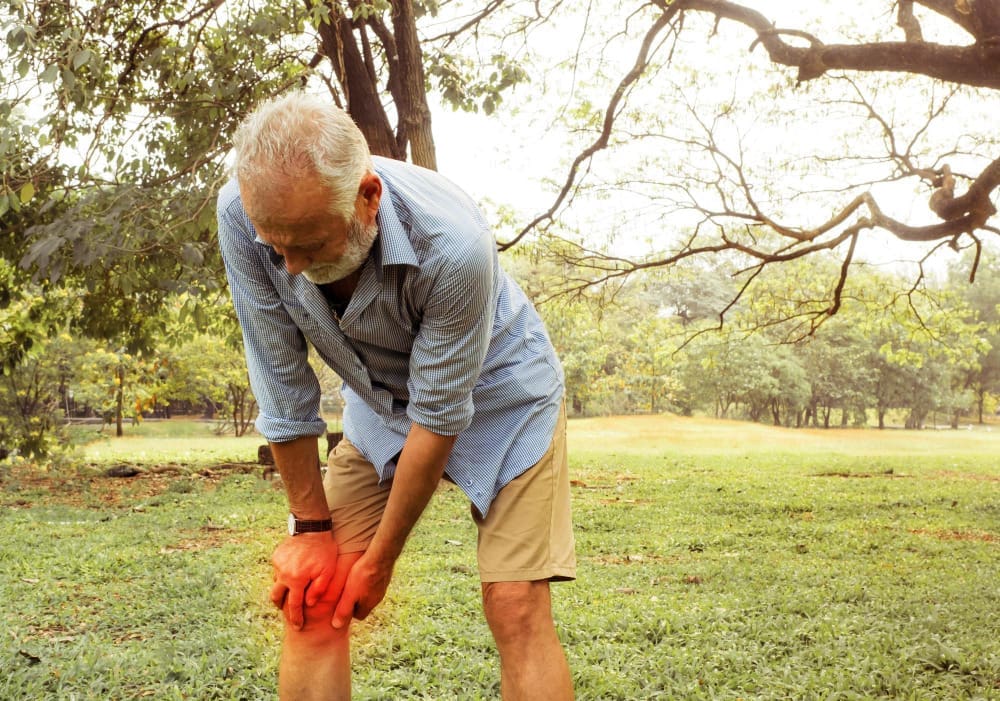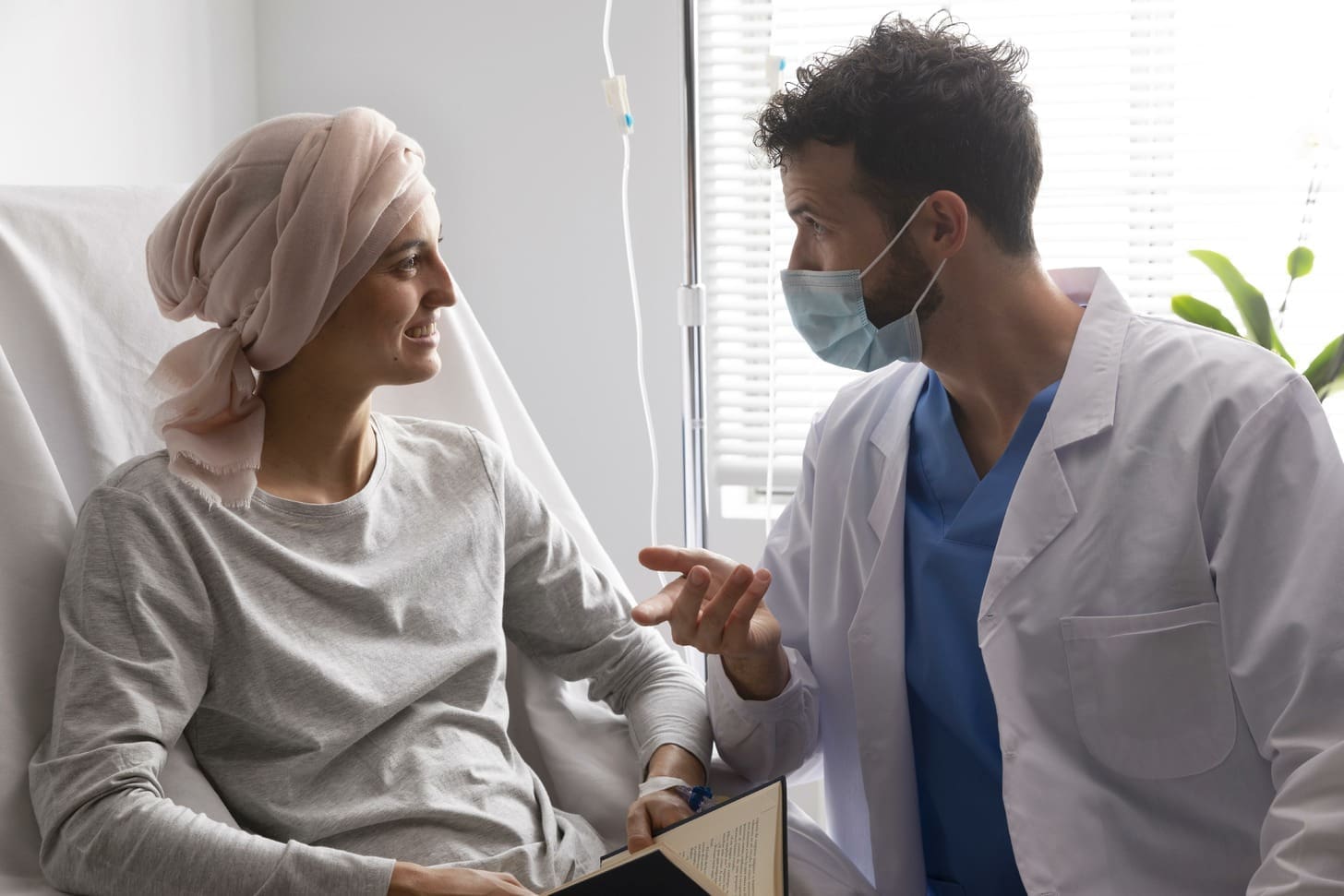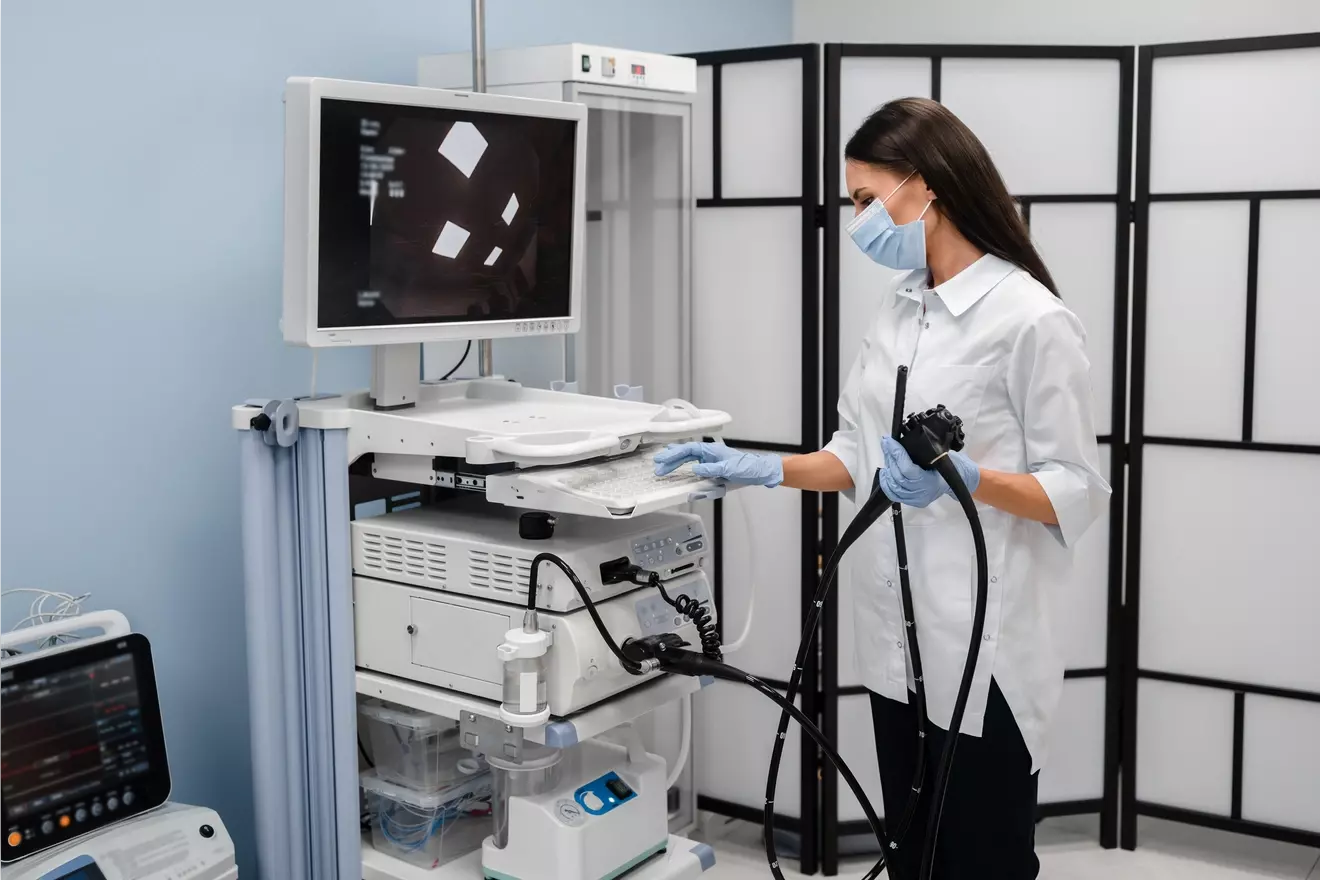Last Updated on November 27, 2025 by Bilal Hasdemir

Getting ready for a CT scan can seem overwhelming. It’s hard to know what to do about fasting, drinking contrast, and other steps. At LivHospital, we’re here to help. We want to make sure your experience is smooth and successful.Our ultimate guide to CT scan time is here. Learn powerful tips for the best preparation, including fasting rules and drinking contrast safely.
A CT scan of the abdomen is a noninvasive test. It helps find many health issues. The scan time can be short or up to an hour, depending on the use of contrast.
We know preparing for a CT scan means learning about the process and what you need to do. Our team is ready to offer top-notch care. We also provide full support and guidance for international patients.
Key Takeaways
- Understand the type of CT scan you are having and its specific requirements.
- Fasting requirements vary depending on the type of scan.
- Drinking contrast is a key step for some CT scans.
- Always follow the instructions from your healthcare provider.
- LivHospital is committed to providing full support and guidance.
Understanding CT Scans and Their Purpose
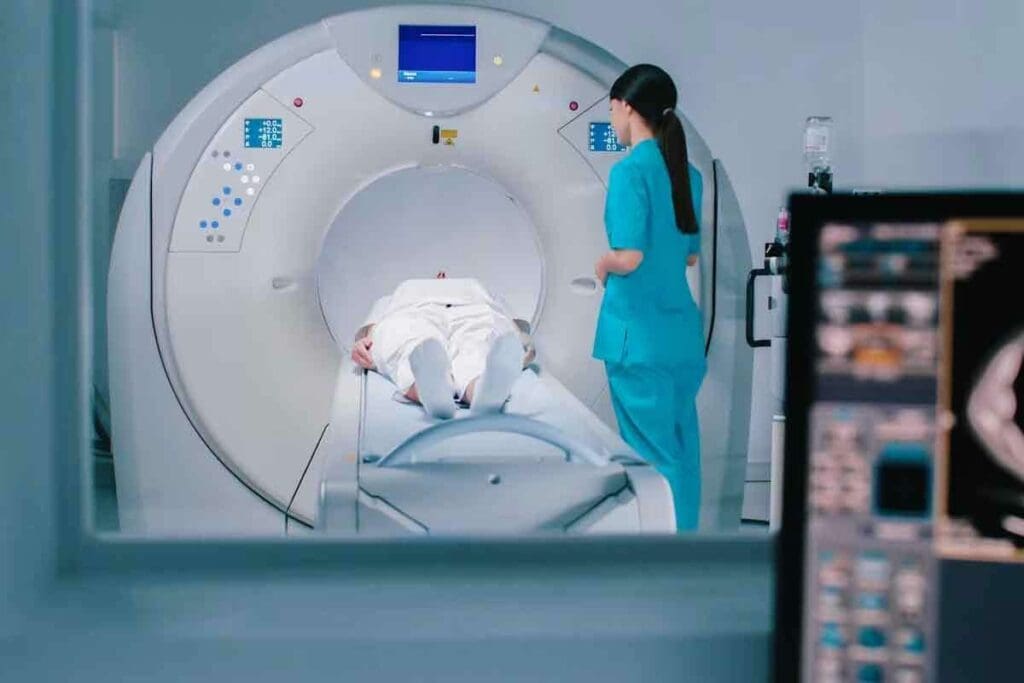
A CT scan is a high-tech medical test that uses X-rays to show detailed pictures of the body’s inside. It’s a key tool in medicine, helping doctors see inside the body clearly.
What is a CT Scan?
A CT (Computed Tomography) scan is a non-invasive test that uses X-rays from different angles. This creates detailed images of the body’s inside. It’s better than regular X-rays for checking many health issues.
Common Reasons for Abdominal CT Scans
Abdominal CT scans help find problems with organs like the liver, kidneys, and intestines. They’re used for:
- Figuring out why you have belly pain
- Finding injuries to the belly’s organs
- Finding tumors, cysts, or other issues
- Helping with biopsies or other procedures
Knowing why you’re getting a CT scan helps you prepare for it.
Different Types of CT Scans
There are many CT scans, each for different body parts or imaging needs. The main ones are:
- Non-contrast CT scans: Done without dye, they’re good for finding things like kidney stones.
- Contrast CT scans: Use dye to make certain areas stand out, helping diagnose some conditions.
- CT angiography: Focuses on blood vessels to spot vascular diseases.
The kind of CT scan you get depends on your health issue and what your doctor needs to see.
CT Scan Time: How Long Does the Procedure Take?
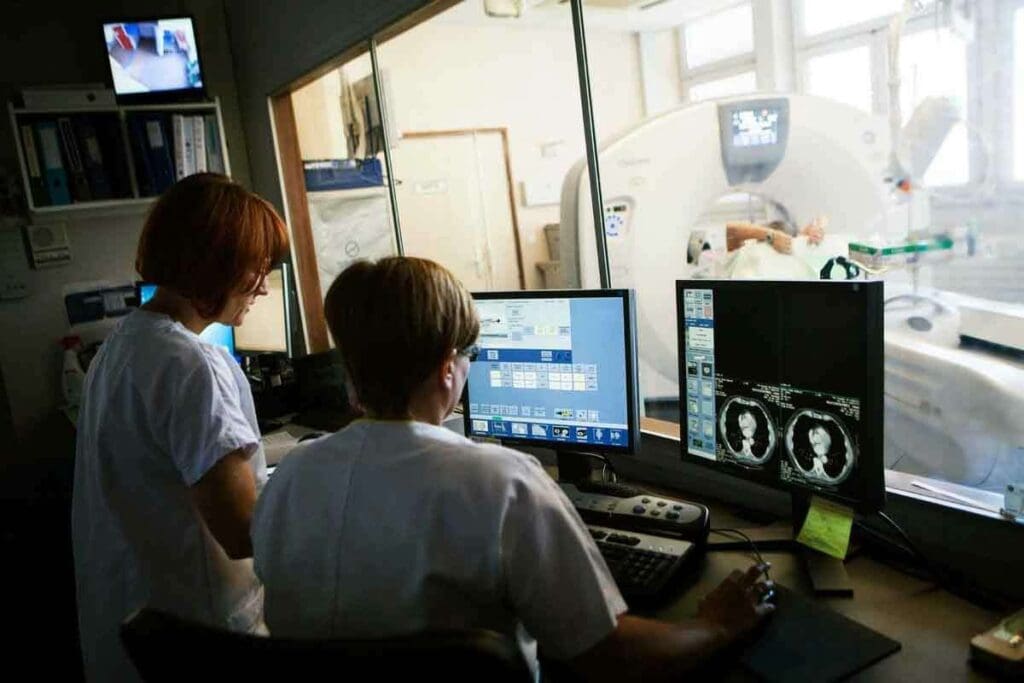
The time a CT scan takes can change a lot. This depends on the scan type and if contrast material is used.
Duration of Non-Contrast CT Scans
Non-contrast CT scans are quick. They usually take just a few minutes. A radiologist, says, “The actual scanning process is usually very fast, often less than five minutes.”
For example, a non-contrast CT scan of the head or abdomen can be done in 2-3 minutes. But, you’ll spend more time at the imaging center. This is because of preparation and getting into position.
Time Requirements for Contrast CT Scans
CT scans with contrast take longer. This is because of the contrast administration and waiting for it to work. For instance, a CT scan with IV contrast may take 15-30 minutes. This includes time for contrast and getting ready.
Oral contrast CT scans can take even longer, sometimes up to an hour. This is because patients have to drink the contrast and wait for it to reach the right areas before the scan.
Total Time Commitment Including Preparation
Even though the scan itself is short, the total time is about an hour. Most of this time is for getting ready. This includes registration, changing into a gown, and getting instructions.
According to recent data, patients should plan to spend about an hour at the imaging center. Even though the scan itself is usually under five minutes.
Key Takeaways:
- Non-contrast CT scans are typically quicker, taking only a few minutes.
- Contrast CT scans take longer due to the administration and effect of the contrast material.
- Total time at the imaging center is usually around an hour, mostly for preparation.
“Understanding the time requirements for your CT scan can help you plan your day more effectively and reduce any anxiety about the procedure,” notes a specialist in radiology.
General Preparation Guidelines for All CT Scans
Getting ready for a CT scan is important. It makes sure the scan goes well and safely. It also helps get clear images for a correct diagnosis.
When to Arrive at the Imaging Center
Make sure to arrive early at the imaging center. Your doctor will tell you when to come.
Being early lets you do paperwork and get ready. It also means you can ask any questions you have.
What to Bring to Your Appointment
Wear comfortable clothing for your CT scan. You might need to change into a gown.
Also, bring any medical records you have. This includes past scans and a list of your medicines. It helps the team understand your health.
Medical Information to Disclose
Tell your doctor about any health issues you have. This includes diabetes, kidney disease, or allergies. It helps plan your scan.
If you think you might be pregnant, tell your doctor. They can then decide if the scan is safe for you.
| Preparation Step | Description | Importance |
| Arrive Early | Plan to arrive at least 30 minutes before your scheduled appointment time. | High |
| Comfortable Clothing | Wear loose, comfortable clothing and avoid wearing jewelry or clothing with metal parts. | Medium |
| Medical Records | Bring any relevant medical records, including previous imaging studies and a list of your medications. | High |
| Disclosure of Medical Conditions | Inform your healthcare provider about any medical conditions, such as diabetes, kidney disease, or allergies. | High |
Fasting Requirements for CT Scans
Fasting needs for CT scans vary based on several factors, like the use of contrast agents. Knowing these needs is key for good preparation and a smooth scan.
Do You Have to Fast for a CT Scan?
Whether fasting is needed before a CT scan depends on the type of scan. For scans of the abdomen or pelvis, fasting might be required for clear images. Your healthcare provider or the imaging center will tell you the fasting rules.
“Fasting before a CT scan is common, mainly when contrast materials are used,” says a radiologist. “Following the given instructions is vital for the best results.”
Fasting Guidelines for Different Types of CT Scans
CT scans have different fasting rules. For example:
- Non-contrast CT scans might not need fasting.
- Scans with oral or IV contrast may require fasting for hours.
- Abdominal CT scans often need fasting to get clear images.
It’s important to follow the specific instructions from your healthcare provider or the imaging facility. These will be based on your needs and the scan type.
Can You Drink Water Before a CT Scan?
Drinking water before a CT scan is often okay, even if you’re fasting. Staying hydrated helps with IV insertion if contrast is used. But, always check with your imaging center about water before your scan.
In summary, fasting rules for CT scans can change. Knowing your scan’s specific needs is essential for a successful procedure. Always follow your healthcare team’s guidelines for the best results.
Understanding Contrast Agents in CT Imaging
Contrast agents are used in CT imaging to improve accuracy. They make certain body areas more visible during a scan.
Types of Contrast Materials Used
There are two main types of contrast materials: oral and intravenous (IV). Oral contrast is drunk before the scan to show the digestive tract. IV contrast is injected to highlight blood vessels and organs.
Oral contrast often includes barium or iodine. Barium sulfate is used for the gut. Iodine-based contrasts are better for other scans because they’re safe for the kidneys.
Why Contrast Is Used in Some CT Scans
Contrast agents make it easier to see tissues, organs, and blood vessels on CT scans. Your doctor will inject the dye through an IV for a CT scan with contrast. This is key for spotting tumors, vascular diseases, and inflammation.
“The administration of contrast agents has become an indispensable tool in radiology, allowing for more precise diagnoses and treatment plans.” –
Radiology Expert
Patients Who May Not Be Eligible for Contrast
Not everyone can have contrast agents. Those with severe kidney disease or allergies to contrast are at risk. The dye can harm kidneys further and cause allergic reactions.
- Patients with a history of allergic reactions to contrast agents
- Individuals with severe kidney or liver disease
- Pregnant or breastfeeding women (in certain cases)
Telling your doctor about your medical history is key before a CT scan with contrast. This helps them decide if contrast is safe for you.
For some scans, you’ll need to drink a contrast solution 1-2 hours before. This is common for abdominal CT scans. It helps show the intestines and other parts of the abdomen.
Oral Contrast: What to Expect
Drinking oral contrast before a CT scan is common for many patients. This liquid makes the intestines and nearby areas stand out during the scan. It helps doctors spot certain conditions more easily.
What Do You Drink Before a CT Scan?
The liquid tastes bad, often bitter or metallic. The exact taste can change based on the scan’s needs and where you get it.
Types of Oral Contrast:
- Barium sulfate: This is a common oral contrast agent that is not absorbed by the body and helps to outline the intestines.
- Iodine-based contrast: Sometimes used for patients who cannot tolerate barium sulfate.
Timing of Oral Contrast Consumption
When to drink the contrast varies. Some places want you to start a few hours before. Others give it right before the scan.
| Timing | Instructions |
| 1-2 hours before scan | Drink the oral contrast as directed by your healthcare provider. |
| Immediately before scan | Consume the contrast as instructed at the imaging center. |
Managing the Taste and Side Effects
Drinking oral contrast can be hard because of its taste. Here are some tips to help:
- Chilling the contrast liquid in the refrigerator before consumption.
- Drinking it through a straw to minimize contact with your taste buds.
- Rinsing your mouth with water or a flavored mouthwash afterward.
Also, some medicines might need to stop before the scan. Always follow your doctor’s advice.
Knowing what to expect and how to handle the contrast can help you get ready for a good CT scan.
IV Contrast: Preparation and Administration
Understanding the CT scan with IV contrast process can help reduce anxiety. IV contrast is given through a vein to make your internal structures clearer. This is key for accurate diagnoses.
How IV Contrast Is Administered
When you arrive for your CT scan, a healthcare professional will get you ready. They will insert a small needle into a vein in your arm. This is where the contrast dye is injected.
The contrast dye is absorbed by your body and helps highlight the areas of interest during the CT scan. This is important for getting the best images for your healthcare provider to diagnose you accurately.
Sensations You May Experience
As the IV contrast is given, you might feel some sensations. You might feel a warm or cold sensation, a metallic taste, or feel flushed. These feelings are usually short-lived and go away after the procedure.
It’s important to tell your healthcare provider if you have any concerns or feel unusual symptoms during or after the IV contrast.
Aftercare Following IV Contrast
After your CT scan with IV contrast, you can usually go back to your normal activities. The contrast dye is removed from your body through your kidneys and urine. Drinking lots of water helps this process.
In some cases, you might be watched for a bit after the scan to see if you have any bad reactions to the dye. If you have trouble breathing, severe itching, or swelling after leaving, get medical help right away.
Specific Preparation for Abdominal CT Scans
Abdominal CT scans need careful preparation for clear images. We know preparing for a CT scan can be tough. But with the right help, you can feel more ready.
Dietary Restrictions Before an Abdominal Scan
Before an abdominal CT scan, you might need to change your diet. Patients often have to eat only clear liquids before the scan. This makes sure food and fluids don’t mess up the images.
For some scans, you might need to eat only clear liquids for days. You might also use laxatives or enemas to clean your bowel. We’ll tell you exactly what you need to do based on your scan.
Medication Considerations
Tell us about any medicines you’re taking. Some might need to be changed or stopped before the scan. We’ll help you figure out how to manage your medicines.
Prep for CT Abdomen and Pelvis
When scanning both the abdomen and pelvis, the prep is similar. The goal is to get clear images from both areas. This might include dietary changes, staying hydrated, and possibly using contrast materials.
Here’s what you can expect when preparing for a CT scan of the abdomen and pelvis:
| Preparation Step | Description | Timing |
| Dietary Adjustments | Clear liquid diet | 1-2 days before the scan |
| Bowel Preparation | Laxative or enema | As instructed by your healthcare provider |
| Medication Management | Adjust or stop certain medications | As advised by your healthcare provider |
By following these steps and your healthcare team’s advice, you can help make your CT scan a success. This ensures the images are the best they can be.
What to Wear and What to Remove
To make your CT scan smooth and efficient, dressing right is key. We’ll help you know what to wear and what to take off. Getting ready is important for a good CT scan.
Clothing Recommendations
Wear loose, comfortable clothing for your CT scan. This keeps you comfy during the scan. Don’t wear clothes with metal parts like zippers or buttons. They can mess with the scan.
Jewelry and Metal Objects
You’ll need to remove jewelry or metal objects before the scan. This includes hair clips, belt buckles, and bras with metal wires. Taking these off helps us get clear images.
Dentures, Hearing Aids, and Other Removable Items
Some items like dentures, hearing aids, or other removable devices might need to go. Our team will tell you what to remove based on your scan type.
Special Considerations for Certain Patients
Some medical conditions require special care before a CT scan. People with diabetes, kidney issues, or allergies need extra steps. These steps help ensure their safety during the scan.
Preparation for Diabetic Patients
Diabetics should tell their doctor about their condition and any meds they’re on, like metformin. It’s key to talk about when to take meds before the scan. This is because some meds might need to be changed or stopped.
- Inform your doctor about your diabetes and any medications.
- Discuss the timing of your medication in relation to the CT scan.
- Follow any specific dietary instructions provided by your healthcare provider.
Considerations for Patients with Kidney Issues
Those with kidney problems face a higher risk of kidney damage from contrast agents. Telling your doctor about kidney issues is critical. They might adjust the contrast or choose a different imaging method.
- Disclose any kidney issues to your healthcare provider.
- Undergo a kidney function test if necessary.
- Follow the recommended hydration plan to minimize risks.
Pregnancy and CT Scans
Pregnant women should tell their doctor about their pregnancy. CT scans are not usually recommended because of radiation. But, sometimes the benefits might be worth the risks. Doctors often look for safer options first.
Allergies and Previous Reactions to Contrast
If you’ve had allergic reactions to contrast agents, tell your doctor. They might give you steroids or antihistamines to prevent another reaction during the scan.
- Inform your healthcare provider about any allergies or previous reactions.
- Follow the premedication regimen as prescribed.
- Report any symptoms or concerns to your healthcare provider immediately.
By understanding and following these special considerations, patients with unique medical conditions can safely prepare for their CT scan. This ensures the best possible outcomes.
Potential Side Effects and What to Watch For
CT scans are usually safe, but there are possible side effects. These are more common with contrast materials. Knowing about these can help you prepare and understand what to expect.
Common Reactions to Contrast Materials
Some people may have side effects from the contrast used in CT scans. These can be mild or severe. They might include:
- Flushing or a warm sensation
- Metallic taste
- Nausea or vomiting
- Allergic reactions, such as hives or itching
Tell your doctor about any past reactions or allergies.
When to Seek Medical Attention
Most side effects are mild and short-lived. But, some need immediate attention. If you have symptoms like:
- Difficulty breathing
- Swelling of the face, lips, or throat
- Severe abdominal pain
- Rapid heartbeat or palpitations
Knowing these severe reactions can help you get the right help quickly.
Recovery Time After a CT Scan
For most, the CT scan is quick and doesn’t need recovery time. But, if you got contrast material, you might need to:
| Activity | Recommendation |
| Hydration | Drink plenty of water to help flush out the contrast material |
| Activity Level | Resume normal activities unless your doctor says not to |
| Monitoring | Watch for any side effects and report them to your healthcare provider |
Always follow your healthcare team’s post-procedure care instructions.
Understanding side effects and following precautions can make your CT scan experience safe and smooth.
Conclusion: After Your CT Scan
After your CT scan, you can usually go back to your normal activities. Your healthcare provider might tell you differently. The scan itself takes about 10 to 30 minutes. You’ll get your results in a few days.
If you had to drink something special before the scan, you might wonder what happens next. Usually, the drink passes through your system easily. You might also be told if you can drink water or eat normally after.
Your healthcare team will give you specific instructions. They’ll tell you when you can eat normally again. They’ll also let you know about any side effects to watch for. If you’re unsure about what to drink before the scan, ask your healthcare provider.
Most people can go back to their daily routines right after a CT scan. If you have questions about your results or the preparation, talk to your healthcare provider. They can answer your questions about drinking water before the scan.
FAQ
What is a CT scan, and why is it used?
A CT scan is a test that makes detailed pictures of the body’s inside. It helps doctors find and check on injuries, cancers, and blood vessel problems.
Do I have to fast for a CT scan?
Fasting rules change based on the CT scan type. For some, like the abdomen, fasting for a few hours is needed. Your specific instructions will depend on your scan.
What do I drink before a CT scan?
For some scans, you might need to drink a special liquid. This helps doctors see certain areas better. Your doctor will tell you how much and what kind to drink.
Can I drink water before a CT scan?
Usually, you can drink water before a CT scan. But, always check with your doctor first. Rules can change based on your scan.
How long does a CT scan take?
CT scan time varies. It depends on the scan type and if contrast is used. Scans can last from a few minutes to an hour, including getting ready.
What should I wear for a CT scan?
Wear comfy, loose clothes without metal. You might need to change into a gown. Remove any jewelry or metal items that could get in the way.
Are there any special considerations for diabetic patients undergoing a CT scan?
If you’re diabetic, tell your doctor about your condition and meds. This includes metformin, which might need to be adjusted for scans with contrast.
Can I have a CT scan if I’m pregnant?
Pregnancy affects CT scan decisions. Tell your doctor if you’re pregnant or might be. They might suggest other imaging options.
What are the possible side effects of CT scan contrast?
Side effects of contrast include nausea, vomiting, and allergic reactions. Most are mild. But, always tell your doctor if you have any symptoms.
How do I prepare for an abdominal CT scan?
Preparation for an abdominal CT scan includes diet rules, fasting, and drinking contrast. Your doctor will give you all the details you need.
What happens after a CT scan?
After a CT scan, you’ll get instructions on what to do next. The images are reviewed by a radiologist. Then, your doctor will talk to you about the results.
References
- NHS. (2023). CT scan. https://www.nhs.uk/conditions/ct-scan/


